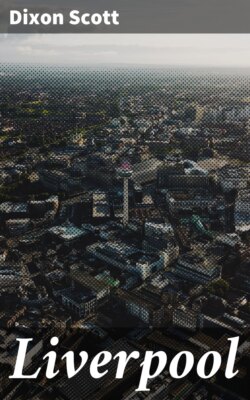Читать книгу Liverpool - Dixon Scott - Страница 8
На сайте Литреса книга снята с продажи.
§ 5.
ОглавлениеTable of Contents
THE LANDING STAGE—SOUTH END.
In view of all this vital domination of the City by its River, there is something singularly appropriate in the nature of the first impression created by Liverpool on the traveller who approaches her from the sea. That first impression is, quite inevitably, an impression of a great river with a city vaguely and ineffectively attached. He has left New York, let us say, a week before, and New York remains on his memory as an intricate, high-piled monument of stone and iron, crowding upon and overshadowing the waters of the Upper Bay. No such effect of dominating human interests salutes him as he steams up the river towards New Brighton from the Bar. The south-swinging curve of the coast hides the City for a while, and for a while he sees nothing but a long, low line of bourgeois villas, sitting comfortably among the sandhills on his left, and the great sky-snipping lattice of the New Brighton Tower rising, not inelegantly, ahead. The houses on his left increase; Waterloo and Seaforth shine pleasantly in the sun; and from the base of the Tower, behind the domed and glittering pier that swims delicately out into the water from its root, more bourgeois villas and a great plenitude of white sea-promenades, stretching away up the coast to Egremont, up, beyond sight, to Seacombe, carry out the note of mild watering-place delights. It is all very charming, thinks the visitor, but it doesn’t particularly suggest any furious commercial maelstrom. … The town swings into foreshortened vision, flat and docile beyond the racing tide: a mild, smoke-softened, wavering of roofs, a sporadic spire or so, a dozen and a half of chimney-stalks, and the dun cloud overhead—the constant cloud that ought certainly to speak impressively of industry, but that seems, somehow, on the contrary, to mitigate all the efforts (none of them very energetic) that the City makes in the direction of mass and lordliness. With the steep uprising of the Seaforth battery comes the first of the dumb grey miles of granite that stretch up-river to the Stage. They testify nothing to man’s sovereignty, these great dock-walls; they seem—if, indeed, they seem of human origin at all—no more than an enforced defence-work; and the quiet rigging discernible behind them, and the funnels of a hidden liner, carry on that idea of the River’s superior strength—a strength sufficient to pass the grey barriers and create a second kingdom in the plains beyond. A couple of little towers, perched on the wall, make pseudo-romantic notes—absent, archaic, meaningless. A great warehouse, four-square and stolid, with blind eyes, is set heavily down like a dull box—a box that may be full or empty, but that is undoubtedly shut and locked, whose key has undoubtedly been mislaid. More warehouses, all equally immobile, sullenly succeed it; and then the Landing-stage itself, low and level and a trifle dingy, begins to run humbly alongside, spirting out at intervals a little squeal of advertisement-begotten colour. And still there is no resounding manifestation from the City. The fretted tower of St. Nicholas makes a neatly punctured patch upon the sky; the Town Hall Dome shows vaguely; there is an unexplained glitter from the baseless crest of the Royal Insurance Office. But the solitary building within sight that swerves up with any unmistakable authority is the building of the Mersey Docks and Harbour Board.
And beneath, or beside, all this flatness and domesticity, the Mersey itself reels and swaggers splendidly. It is turgid and tumultuous; its bustling highways interlace alarmingly; there is a constant shouting and hooting and dancing of eager craft. Higher up-stream, the vast salt lake of the Sloyne holds a brace of liners, each, as it would seem, more massive than the town; and a tall imperturbable frigate sways graciously out towards the sea, bursting into white sail-bloom as she goes. …
Nor, when he steps ashore, and climbs up Water Street to the City’s hub, does that effect of the River’s supremacy utterly forsake him. Salt airs from the sea pursue him; strange tongues salute his ears; far-brought merchandise is plucked hither and thither about him as he goes. And even when he passes through the heart of the City and into the suburbs beyond, and through the belt of these into the open country that stretches towards the east, the sting of the brine will from time to time assault him, and he will hear the endless crying of sea-birds, and he will watch the grey, innumerable gulls as they rise and fall above the red wake of the plough.
